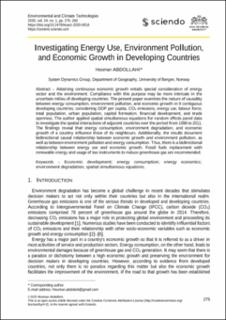Investigating Energy Use, Environment Pollution, and Economic Growth in Developing Countries
Journal article, Peer reviewed
Published version

Åpne
Permanent lenke
https://hdl.handle.net/11250/2765571Utgivelsesdato
2020-05-04Metadata
Vis full innførselSamlinger
- Department of Geography [672]
- Registrations from Cristin [10237]
Originalversjon
Scientific Journal of Riga Technical University. Environmental and Climate Technologies. 2020, 24 (1), 275 - 293 10.2478/rtuect-2020-0016Sammendrag
Attaining continuous economic growth entails special consideration of energy sector and the environment. Compliance with this purpose may be more intricate in the uncertain milieu of developing countries. The present paper examines the nature of causality between energy consumption, environment pollution, and economic growth in 8 contiguous developing countries, considering GDP per capita, CO2 emissions, energy use, labour force, total population, urban population, capital formation, financial development, and trade openness. The author applied spatial simultaneous equations for random effects panel data to investigate the spatial interactions of adjacent countries over the period from 1998 to 2011. The findings reveal that energy consumption, environment degradation, and economic growth of a country influence those of its neighbours. Additionally, the results document bidirectional causal relationship between economic growth and environment pollution, as well as between environment pollution and energy consumption. Thus, there is a bidirectional relationship between energy use and economic growth. Fossil fuels replacement with renewable energy and usage of tax instruments to reduce greenhouse gas are recommended.
